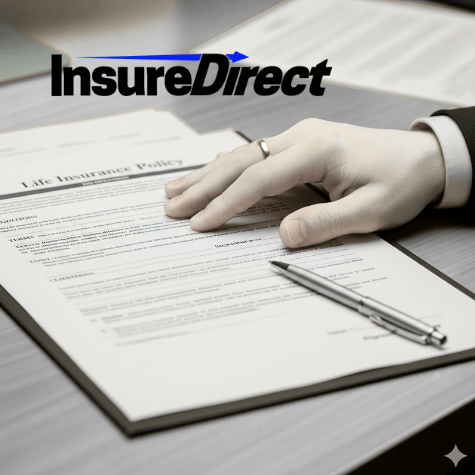I had no idea that liability coverage was necessary when I initially started selling life insurance. *Hey, I’m cautious, what could go wrong?* I thought. Everything, it turns out. A small typo in a form or one client hearing something incorrectly can turn you into the bad guy in a lawsuit. Courts, too? If you “didn’t mean it,” it doesn’t really matter to them.
Life Agent Liability Insurance: What Is It?
In essence, it serves as a contingency plan in case things go wrong. It is sometimes referred to as errors and omissions (E&O) insurance. It’s simply your safeguard in the event that documentation or counsel backfires; it’s nothing fancy. Although occasionally wires cross, people entrust us with their futures. Perhaps a date was written incorrectly, I misspoke about a benefit, or the client expected something I hadn’t promised. Absent E&O? The bills you’re paying on your own have the potential to devour your savings.
Why It’s More Important Than You May Think
Selling life insurance involves more than just policies; it also involves genuine money, family, and trust. I don’t have to say “oops, my bad” if I suggest product failure. It’s monetary harm. Large one. The kind that has the power to wreck a person’s year, including mine.
Let me share what I’ve discovered:
People believe we are flawless. We are to blame for even the slightest misunderstanding. In essence, insurance contracts are legal riddles. You’re the scapegoat if you miss a single sentence. Hiring a lawyer costs money, even if you’re correct. Unless, of course, the burden is being carried by your liability policy. Then there are the regulators, who are constantly watching for an error.
Day’s end? You risk losing both your licence and your sanity if you don’t have this coverage.
Typical Coverages of This Policy (Based on Experience)
This is the summary I put together after reading and, well, feeling a little anxious:
* Inadvertently providing the incorrect premium number.
* Making recommendations for plans that don’t align with a client’s financial objectives.
* Typing a beneficiary’s name incorrectly—yes, it is cruel.
* a customer who says you “promised” something that was never documented.
* Court fees, settlements, and legal defense expenses.
It’s similar to wearing a helmet: you’ll be glad you did even if you never need it.
The Unspoken Aspect No One Alerts You To
It doesn’t cover everything. The fine print (and a headache) was how I found out. Common no-go areas consist of:
* Outright deceiving clients. For that, you’re on your own.
* Fraud or any criminal activity—clearly, but nonetheless.
* Mishaps at work or damage to property. A completely different policy.
* Offering policies for which you lack a licence. Don’t even attempt.
The lesson is that you can avoid the shock later on by being aware of *what’s not covered*. It’s not true to think “I’m safe.”
All OK, but what is the cost-wise damage?
Price is the first question everyone asks. Alright. As a one-person agent, I thought it wasn’t outrageous—roughly $300 to a grand annually, give or take.
Items that affect the cost:
* How much time have you spent doing this? Rookies get paid extra.
* Limits on coverage—$250k or $1M matters.
* Previous assertions. Hold on tight if you have already been sued.
* Agency versus solo. More risk, more personnel, and more expense.
When you contrast that with the cost of a lawsuit, which may easily reach tens of thousands, the yearly premium seems insignificant.
Why My Breathing Is Actually Easier Now
It’s psychological protection, not simply financial gain. With a safety net in place, I enter client encounters with more composure. The majority of brokerages won’t even allow you to onboard without confirmation of E&O coverage, so it also appears professional. Additionally, I don’t spiral if something does go wrong. I manage it.
In a nutshell: I sell life insurance to help my clients rest easy. For me, liability insurance works similarly.
Advice Based on My Own Research
I made several beginner errors when I was shopping for my coverage, but here is something I wish I had known sooner:
* Don’t choose the least expensive plan just because it’s inexpensive. You pay for what you receive. Even the dull sections of the exclusions should be read. That’s where they conceal the sly stuff.
* Inquire about “tail coverage.” Even *after* you retire, you are still protected. Look for a broker that is an expert in E&O. I avoided paying too much for pointless coverage thanks to mine.
A Tale That Will Remain in My Memory
A family was originally offered a “guaranteed” benefit payout by an old coworker, but it wasn’t guaranteed; rather, it was fluctuating. When the returns declined years later, they filed a lawsuit. The court didn’t care, even though he vowed he never said it that way. His liability insurance paid the price, including settlement and legal fees. He would have gone bankrupt without it.
I have that narrative ingrained in my memory.
The bottom line
You are risking your career if you are a life insurance salesperson and believe that E&O is optional. Stories change, clients forget, and tempers erupt. A single lawsuit has the power to destroy you more quickly than you can say “policy lapse.”
For peace of mind, families purchase life insurance. Liability insurance is purchased by agents for the *exact same reason.*
Therefore, stop waiting if you’re still thinking “maybe later.” Now do it. Because you’ll thank yourself a thousand times over when the storm comes—and it will.
—
Are you trying to get dependable coverage?** InsureDirect can help. It’s really easy and quick to get a quote.
📍 **InsureDirect.com** 🏢 **Corporate Home Office** 618 South Broad Street **[contact@insuredirect.com] Lansdale, Pennsylvania 19446The email address is contact@insuredirect.com.(800) 807-0762, extension 602 ** 📞
Keep your house safe. Keep your career safe. Keep *you* safe. For mental tranquility? That is the essence of true insurance.

